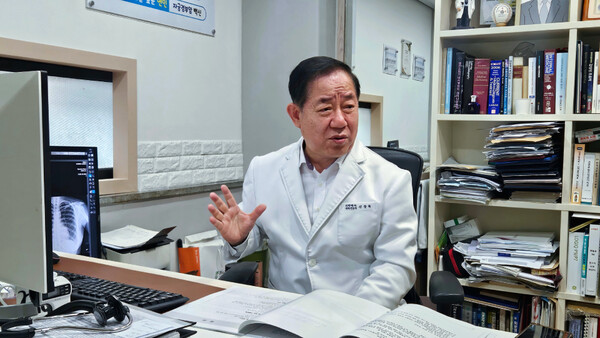Neighborhood clinics face a harsh reality. They must charge low fees, and medical workers are hard to find. They must compete with public health centers and the “nearby university hospitals.”. The regulars get old and sick, and there's not much these clinics can do. Many neighborhood clinics try to speak on behalf of their patients who are desperate for a dime, but there is no one to listen to such stories. All this shows why these clinics find it difficult to secure their place in the community care system.

That also explains why the Korean Physicians’ Association (KPA) is busy ahead of the presidential election. Clinics and primary care providers are searching for a way forward in the face of “a vague concept of essential care” and the unprecedentedly rapid aging of the global population. They also need to prepare for the aftermath of the government-doctor conflicts created by government healthcare reform. After issuing an opinion paper to revitalize primary healthcare, the KPA formed a presidential election planning committee and recently released a healthcare policy proposal for the 21st presidential election. Unlike the Korean Medical Association (KMA), which focuses on “general theories,” the KPA focuses on “individual theories” from the perspective of regional internal medicine.
“What we proposed is to start 'Korean-style primary healthcare,' which is proper primary healthcare that resonates with the field and reaches out to the people,” said Shin Chang-rok, chairman of the presidential campaign planning committee, when he met with reporters last Thursday. “The government thinks a few research studies, a few task force (TF) teams, and a few pilot projects” will produce ‘the right answer for primary healthcare,’ he said, adding that he would share with the government “the answers he has learned in the field while seeing patients every day. Internal medicine is the closest to primary healthcare.”
But that doesn't mean the organization is biased in favor of internal medicine. He emphasized that he and his colleagues, including KPA Chairman Lee Jung-yong, have been collecting members' opinions and discussing them repeatedly.
Among a wide range of proposals, ranging from saving essential medical care and “splitting the conversion index” to expanding national immunization programs and creating more drug use services (DURs), Shin's first agenda item was “reorganizing the medical delivery system.” Each new government has developed policies to normalize the medical delivery system, but “they have failed to hit the core,” he said. University hospitals, including tertiary general hospitals, compete with neighborhood physicians for increased revenue and incentives. It is difficult to normalize the healthcare delivery system by merely recommending that people “use nearby hospitals” while ignoring the tendency of people to visit university hospitals even for health checkups or minor illnesses.
Shin said this behavior weakens the roots of “the basic system of our society”—primary healthcare and the medical delivery system. He said it should be subject to strict regulation if necessary. It's time for society to “recognize more clearly that even a single visit to the hospital is a social system issue,” he added.
Shin emphasized that the issue of essential care also needs to be recognized. “It's not just about ‘life-and-death emergencies’ but also everyday health care. If we build up basic health every day with the most basic medical care, the risk of an emergency is reduced,” Shin said. “Saving essential healthcare depends on how well and stably primary healthcare develops.”
That also explains the KPA's efforts to address the aging population. While increasing treatment and immunization fees is necessary, “there should also be policy support to help clinics develop the capacity to respond more proactively to an aging society.” He said that preventing and managing diseases in the early stages can prevent the enormous consumption of health insurance finances due to severe illnesses and complications. “We need to move away from marginalizing geriatric care, and it is increasingly difficult to afford medical expenses as the number of elderly people increases.” He also said that the country's failure to integrate medical care into the community while touting community-integrated care as a measure for the ultra-elderly should be improved. “Let doctors lead, not just come and watch,” Shin said.
This is how the KPA hopes to revitalize primary healthcare by gaining policy support and initiative, as it wants “policies that have seen the field.” “Korea's national income is among the top 10 in the world, but somewhere, there are patients short of even 1,500 won ($1.1). Every penny is directly related to their livelihood.” Neighborhood physicians encounter such patients. They know how much of a burden a 30,000-won co-payment for a visit can be for them. “It's hard for me to say to a patient lying on the bed, 'Please pay this much,'” he says. That's why the KPA's call to treat neighborhood clinicians as partners in healthcare policy means “let's talk and think about the realities they face every day, not “protecting our turf.”
“We need to make the government, the political community, and our society newly aware that private practitioners are also policy partners who are constantly thinking about Korean healthcare and the people's health,” Shin said. “We will try to turn this policy proposal into action as the next government's healthcare policy after the presidential election.”
Related articles
- Presidential candidates: Who will rewrite Korea's healthcare playbook?
- Ahead of presidential election, calls for shorter service for public health doctors gain momentum
- Surge in military enlisting among medical students sparks fears of regional healthcare collapse
- Medical community welcomes Yoon’s removal, urges end to misguided healthcare policies
- NRP pledges to scrap Yoon's healthcare reform, promises doctor-centered policy
- Doctors group seeks audit of health ministry over med school admission expansion
- Doctors' group urges new government to prioritize restoring trust

